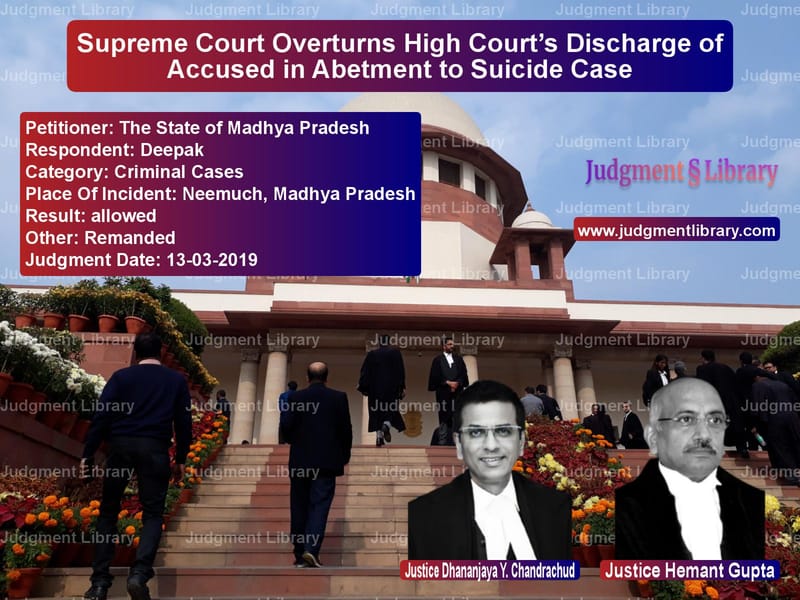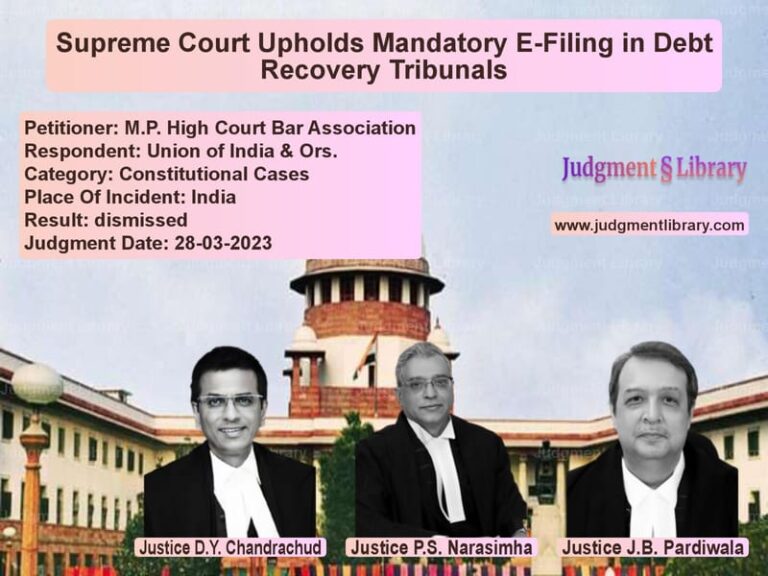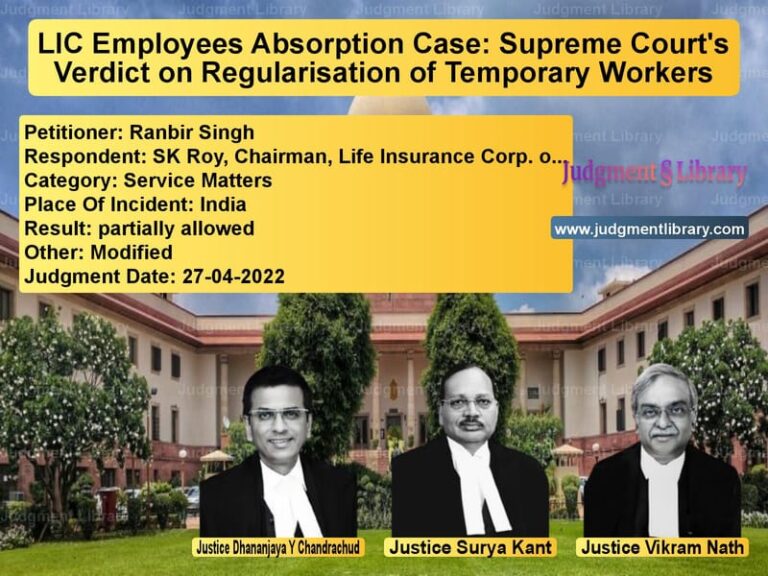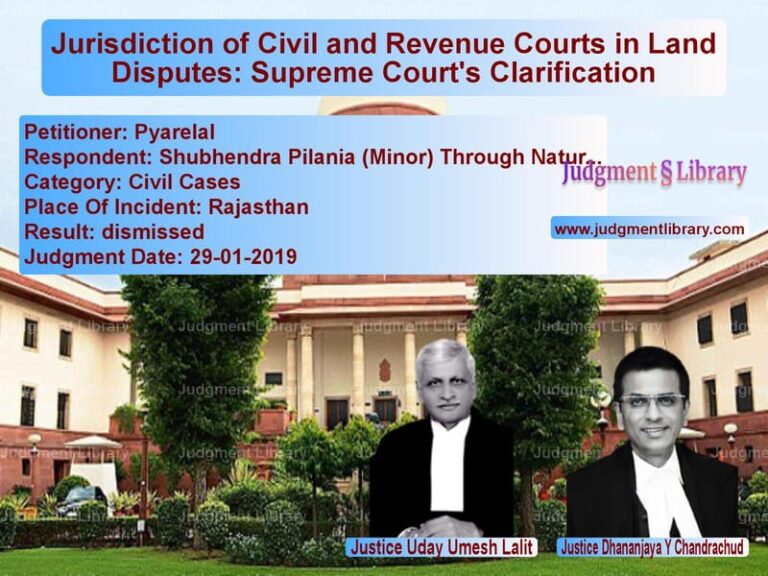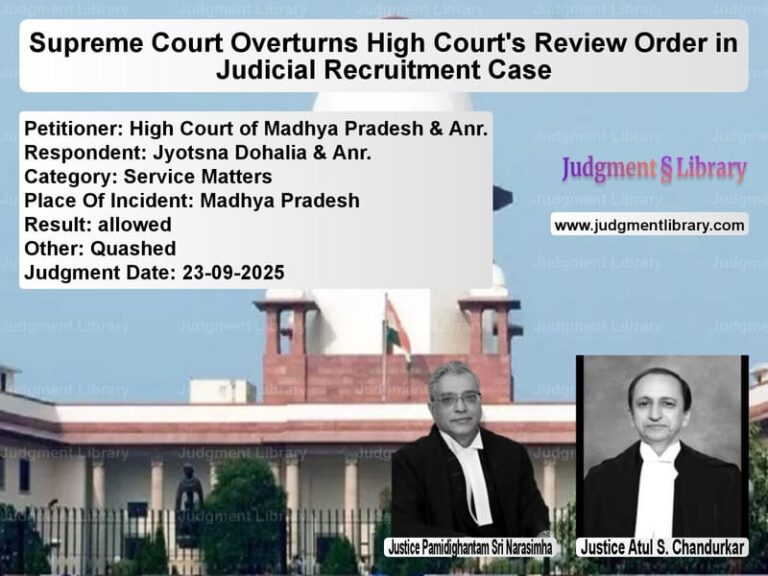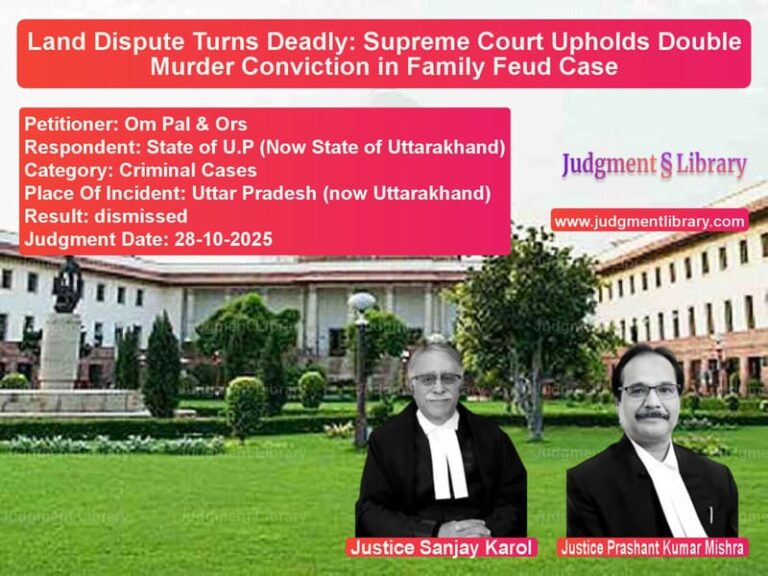Supreme Court Overturns High Court’s Discharge of Accused in Abetment to Suicide Case
The Supreme Court of India, in The State of Madhya Pradesh vs. Deepak, delivered a significant ruling regarding abetment to suicide under Section 306 of the Indian Penal Code (IPC) and the Scheduled Castes and Scheduled Tribes (Prevention of Atrocities) Act, 1989. The case involved the alleged harassment of a woman, leading to her suicide, and the question of whether the High Court was correct in discharging the accused at the stage of framing charges.
This judgment clarifies the legal standards required for a discharge under Section 397 read with 401 of the Code of Criminal Procedure (CrPC), and the scope of judicial interference in the framing of charges.
Background of the Case
On August 9, 2017, Jyoti Sharma consumed poison at her residence in Neemuch, Madhya Pradesh. She was immediately taken to the district hospital for treatment, where her dying declaration was recorded by the Naib Tehsildar. She stated:
“I am not able to get a job. Wherever I go, Deepak Bhamawat (resident of Jeeran) gets me sacked from the job. Earlier, he had molested me, and I had filed a case against him. Since then, he has been harassing me.”
Jyoti Sharma died on August 10, 2017, at a hospital in Udaipur.
Following her death, an FIR was registered on August 16, 2017. During the investigation, the police discovered:
- The accused and the deceased had both worked at the Central Bank.
- The accused had allegedly taken a loan in the deceased’s name after forging her signature.
- On August 3, 2017, the bank had issued a notice to Jyoti Sharma demanding loan repayment.
- The deceased had filed three complaints against the accused: on November 1, 2016, December 2016, and January 6, 2017, alleging harassment.
- The accused had allegedly influenced her employer to terminate her employment and pressured her landlord to evict her.
Based on these findings, the police filed a charge sheet on September 22, 2017, under:
- Section 306 IPC (Abetment to suicide)
- Section 3(2)(v) and Section 3(2)(v)(a) of the SC/ST Act (Offenses against Scheduled Castes and Tribes)
The Special Judge, Neemuch, took cognizance of the charges on October 13, 2017, and framed charges against the accused on January 10, 2018.
High Court’s Decision
The accused challenged the framing of charges before the Madhya Pradesh High Court, Indore Bench. The High Court discharged the accused on January 31, 2018, stating:
“Merely because the deceased failed to secure employment and believed that the petitioner was responsible, it cannot be said that he had the intention to make her commit suicide.”
The High Court held that the necessary ingredients for abetment to suicide, such as incitement, provocation, or inducement, were absent.
Appeal Before the Supreme Court
The State of Madhya Pradesh appealed against the High Court’s decision, arguing that:
- The High Court ignored crucial evidence, including the deceased’s dying declaration and past complaints.
- The accused’s actions—getting the deceased dismissed from jobs, forcing her eviction, and allegedly taking a loan in her name—amounted to continuous harassment, sufficient to constitute abetment to suicide.
- The High Court exceeded its jurisdiction under Section 397 CrPC by reviewing the sufficiency of evidence rather than determining whether the charges were prima facie sustainable.
The accused, in defense, contended that:
- There was no direct incitement to suicide.
- The prosecution’s case was weak, as the dying declaration only reflected a personal grievance, not an active instigation to suicide.
- The High Court correctly discharged the accused as the material on record did not support abetment under Section 306 IPC.
Supreme Court’s Observations
The Supreme Court examined the scope of judicial interference in framing of charges. The Court emphasized that:
- At the stage of framing charges, courts should not conduct a meticulous examination of evidence.
- The test is whether the material on record prima facie establishes an offense.
- The High Court wrongly discharged the accused by substituting its own view of the evidence at the pre-trial stage.
The Supreme Court referred to its previous rulings in:
- Amit Kapoor v. Ramesh Chander (2012) 9 SCC 460 – Courts should not quash charges unless allegations are so patently absurd that no conviction is possible.
- State of Rajasthan v. Fatehkaran Mehdu (2017) 3 SCC 198 – The presence of strong suspicion is sufficient to frame charges.
- Chitresh Kumar Chopra v. State (NCT of Delhi) (2009) 16 SCC 605 – Abetment to suicide is made out when the accused’s acts create a situation where the victim has no option but to commit suicide.
Based on these precedents, the Supreme Court concluded:
“The High Court has ignored crucial evidence and exceeded its jurisdiction by interfering with the charge framing process. The trial court correctly framed charges based on prima facie material.”
Final Judgment
The Supreme Court allowed the appeal, setting aside the High Court’s order. The key directives were:
- The accused was ordered to stand trial under Section 306 IPC and Sections 3(2)(v) and 3(2)(v)(a) of the SC/ST Act.
- The trial court was directed to proceed with the case without being influenced by the High Court’s observations.
The judgment reaffirmed:
“The framing of charges is not the stage for detailed scrutiny of evidence. As long as there is strong suspicion of an offense, the trial must proceed.”
Conclusion
This ruling reinforces the principle that courts should not intervene at the charge-framing stage unless the case is patently frivolous. The Supreme Court’s decision ensures that cases of abetment to suicide and harassment are tried on their merits rather than being dismissed prematurely.
Petitioner Name: The State of Madhya Pradesh.Respondent Name: Deepak.Judgment By: Justice Dhananjaya Y. Chandrachud, Justice Hemant Gupta.Place Of Incident: Neemuch, Madhya Pradesh.Judgment Date: 13-03-2019.
Don’t miss out on the full details! Download the complete judgment in PDF format below and gain valuable insights instantly!
Download Judgment: The State of Madhya vs Deepak Supreme Court of India Judgment Dated 13-03-2019.pdf
Direct Downlaod Judgment: Direct downlaod this Judgment
See all petitions in Suicide Cases
See all petitions in SC/ST Act Case
See all petitions in Bail and Anticipatory Bail
See all petitions in Judgment by Dhananjaya Y Chandrachud
See all petitions in Judgment by Hemant Gupta
See all petitions in allowed
See all petitions in Remanded
See all petitions in supreme court of India judgments March 2019
See all petitions in 2019 judgments
See all posts in Criminal Cases Category
See all allowed petitions in Criminal Cases Category
See all Dismissed petitions in Criminal Cases Category
See all partially allowed petitions in Criminal Cases Category

